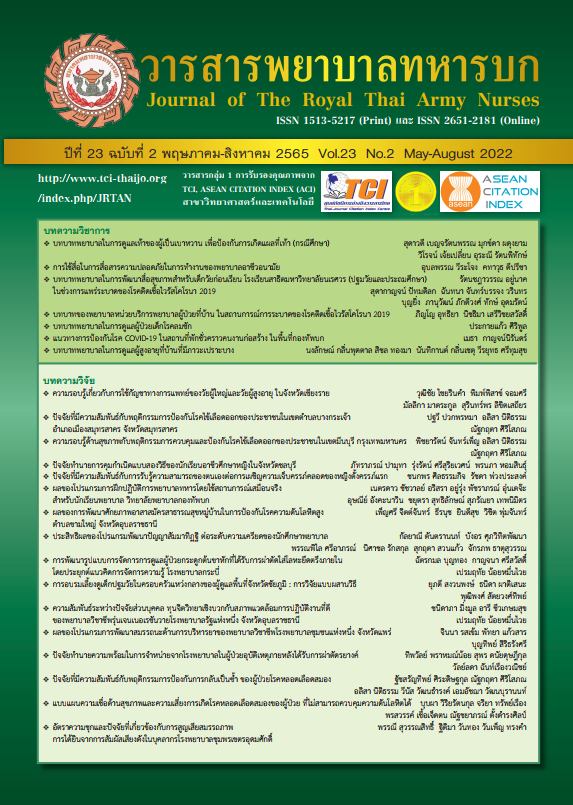The Role of Nurse in Caring for Children with Epilepsy
Keywords:
children, the role of nurse, nurse, epilepsy in childrenAbstract
Epilepsy is a common childhood brain disorder, which affects children physically, mentally, socially and intellectually, causing disabilities that affect the lives of children as well as their families and society. This health problem causes losses in both human resources and economy. If children with epilepsy do not receive the correct treatment and nursing care, their quality of life will be affected. Therefore, nurses who are important healthcare personnel should have the knowledge of the causes and the types of epilepsy, diagnosis, treatment and their effects on patients which are caused by epilepsy pathophysiology and complications from prolonged exposure to antiepileptic drugs. Nurses must have the ability to care for children with epilepsy. They must also perform the role of nurse in assessing patients, taking the history of epileptic seizures, performing physical examinations and analyzing laboratory results and special neurological examinations. This nursing roles must be performed in order to identify the nursing care problems, implement the nursing care process to develop a care plan to prevent complications from epileptic seizures and recurrent epileptic seizures, reduce anxiety for patients and their families, promote the potential of patients and their families in performing self-care at home as well as collaborating with local health services units and relevant people in the community to provide assistance in caring for children with epilepsy and their families.
Downloads
References
Neurological Institute of Thailand. Clinical practice guidelines for epilepsy. Bangkok: Tana Place; 2016. (in Thai)
Goddard A. Neurologic problems. In: MeadowsOliver M, editor. Pediatric nursing made incredibly. 3rd ed. Philadelphia: Wolters Kluwer; 2019. p. 262-67.
Tagher CG, Knapp LM. Pediatric nursing: a case-based approach. Philadelphia: Wolters Kluwer; 2020. p. 397-400.
Rosenblum RK, Crawford DJ. Neurologic disorders. In: Maaks DG, Starr NB, Brady MA, Gaylord NM, Driessnack M, Duderstadt KG, editors. Pediatric primary care. Missouri: Elsevier; 2020. p. 990-93.
Miller K. Neurological disorders. In: Richardson B, editor. Pediatric primary care: practice guideline for nurses. Indiana: HealthNet; 2017. p. 531-33.
Aaberg kM, Gunnes N, Bakken IJ, Soraas CL, Berntsen A, Magnus P, et al. Incidence and prevalence of childhood epilepsy: a national cohort study. Pediatrics 2017; 139(5): e20163908.
Nikrothanond T, Limwattananon C, Limwattananon S. Medicine possession ratio of antiepileptics in pediatric patients with epilepsy in Queen Sirikit National Institute of child health. Journal of the Department of Medical Service 2020; 45(3): 98-106. (in Thai)
Scheffer IE, Berkovic S, Capovilla G, Connoll MB, French J, Guilhoto L, et al. ILAE classification of the epilepsies: position paper of the ILAE commission for classification and terminology. Epilepsia 2017; 58(4): 512–21.
Sakulrungjalas T. Effects of epilepsy on children: prevention and treatment. Thai Journal of Nursing Council 2018; 33(4): 5-18. (in Thai)
Gremi D, Rakpraisuthepsiri N. Zonisamide: topical epilepsy drugs. Thai Journal of Hospital Pharmacy 2019; 29(3): 229-40. (in Thai)
Lamchang S. Nursing care for children with neurological disorders. In: Ngamsuoy A, Sonkongdang W, editors. Nursing care for children with health problems. Chiang Mai: Smart coating and service; 2018. p. 249-54. (in Thai)
Ariyaprana P, Samantreeporn S, Toprayoon Y. Nurse’s role with medical cannabis in treatment of refractory epilepsies in pediatrics. Journal of the Association of Researchers 2021; 26(2): 156-72. (in Thai)
Pidjadee C, Maytapattana M, Prasitsart N. Nurses’ roles in caring children with febrile convulsion. Journal of The Royal Thai Army Nurse 2021; 22(1): 29-37. (in Thai)
Anukunwathaka N, Aree P, Lamchang S. Factors predicting seizure prevention practice in children among caregivers. Nursing Journal 2017; 44(4): 1–12. (in Thai)
Jarintana P, Kongsaktrakul C, Visudtibhan A. The effects of ability promoting program for caregivers of school-age children with epilepsy using CAI on knowledge, perceived self-efficacy, and outcome expectancy. The journal of Faculty of Nursing Burapha University 2019; 27(1): 13-22. (in Thai)
Kangwal C, Kongsaktrakol C, Maneesriwongul W, Visudtibhan A. Factors related to medication adherence among children with epilepsy. Ramathibodi Nursing Journal 2017; 23(1): 44–59. (in Thai)
Wachiraphan A, Chuaichum C. Promoting medication adherence in patients with epilepsy. Journal of MCU Nakhondhat 2020; 7(3): 1–14. (in Thai)
Thongkhum N, Treenai S. The effect of a nursing care program using Swanson’s Caring Model on drug administration behavior of school-age children with epilepsy parents. Journal of the Department of Medical Service 2021; 46(2): 15-23. (in Thai)
Panda PK, Dawman L, Panda P, Sharawat IK. Feasibility and effectiveness of teleconsultation in children with epilepsy amidst the ongoing COVID-19 pandemic in a resource-limited country. European Journal of Epilepsy 2020; 81: 29-35.
Wittawassamrankul R, Sribundit N, Bunchuailua W. Development of epilepsy care program for pediatric patients from stakeholder perspectives. Thai Bulletin of Pharmaceutical Sciences 2022; 17(1): 13–29. (in Thai)
Downloads
Published
How to Cite
Issue
Section
License
Copyright (c) 2022 Journal of The Royal Thai Army Nurses

This work is licensed under a Creative Commons Attribution-NonCommercial-NoDerivatives 4.0 International License.
บทความหรือข้อคิดเห็นใดใดที่ปรากฏในวารสารพยาบาลทหารบกเป็นวรรณกรรมของผู้เขียน ซึ่งบรรณาธิการหรือสมาคมพยาบาลทหารบก ไม่จำเป็นต้องเห็นด้วย
บทความที่ได้รับการตีพิมพ์เป็นลิขสิทธิ์ของวารสารพยาบาลทหารบก
The ideas and opinions expressed in the Journal of The Royal Thai Army Nurses are those of the authors and not necessarily those
of the editor or Royal Thai Army Nurses Association.






